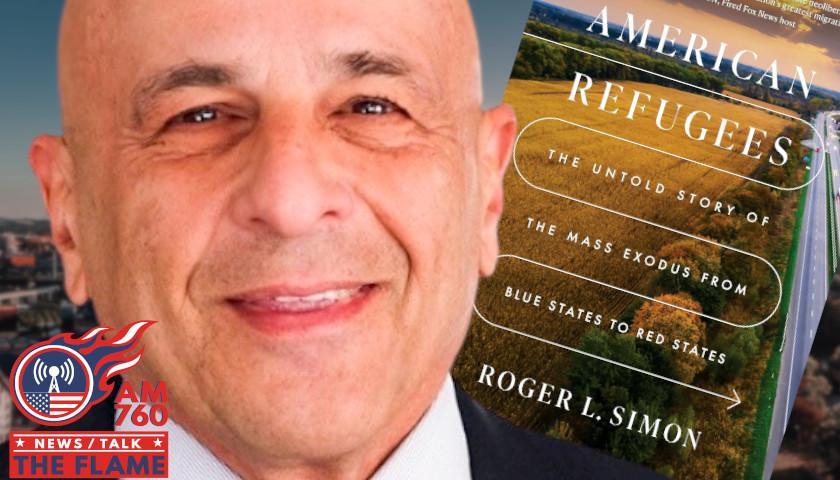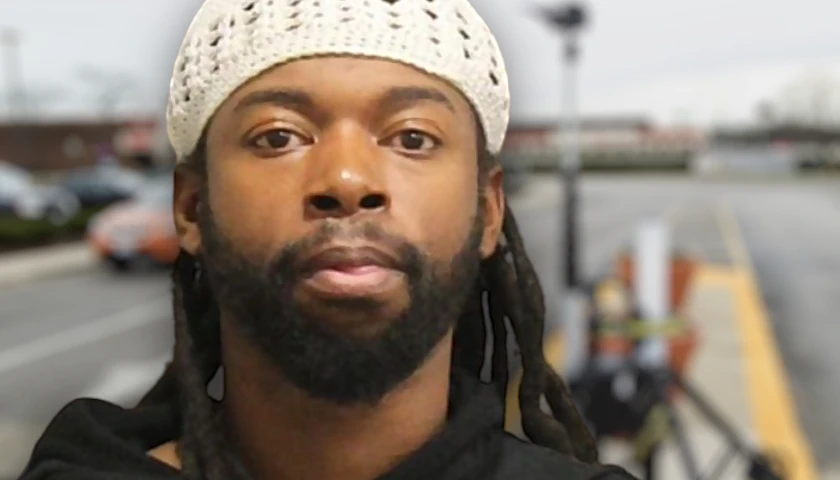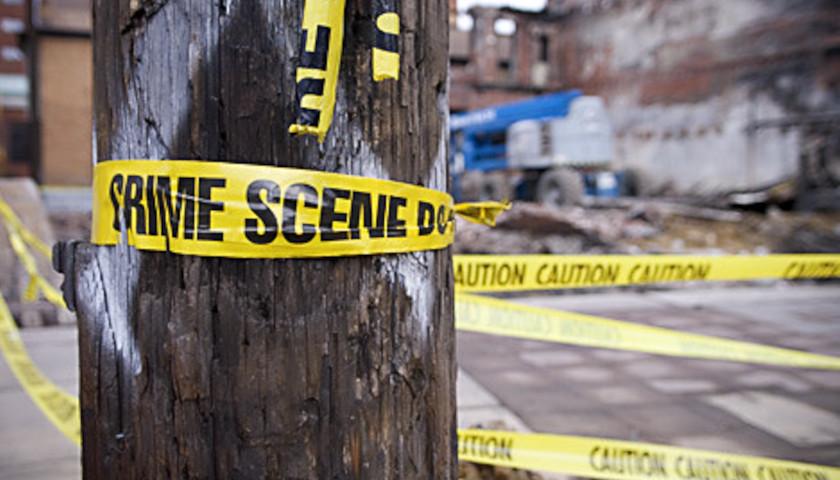Roger Simon joined host Michael Patrick Leahy and original all-star panelist Crom Carmichael in-studio on Friday’s episode of The Tennessee Star Report with Michael Patrick Leahy to discuss Simon’s new, highly-anticipated book, American Refugees.
The Oscar-nominated screenwriter and Epoch Times columnist shared personal details about his own journey to Nashville, including the city he almost moved to before settling on Music City.
TRANSCRIPT
Michael Patrick Leahy: 12:20 p.m.; broadcasting live from our studios in downtown Nashville. In-studio, the original star panelist Crom Carmichael and my former boss at PJTV, Academy Award-nominated screenwriter, and the most popular – depending on the day – contributor at the Epoch Times, Roger Simon.
Roger, I hold in my hands a book – a book called American Refugees the Untold Story of the Mass Exodus from Blue States to Red States.
It’s officially going to be published. Tuesday, right?
Roger Simon: Right – and if you out there have had your rent go up, blame me.
Michael Patrick Leahy: Here’s what some people have to say about this.
Tucker Carlson: “When drought came to the prairie in the 1930s, thousands of Americans moved west to a better life in California. Ninety years later, their descendants are leaving in the wake of another disaster, this one more destructive than the Dust Bowl.”
He also went on to say this about you. Tucker Carlson said, “Roger Simon is among the many refugees fleeing blue state neoliberalism and he’s written the best account of our generation’s greatest migration.”
That’s pretty high praise, Roger.
Roger Simon: Yeah, maybe the only account, though. Give us a couple or the only one at Tucker Ranch.
Crom Carmichael: Give us a couple of tidbits. Tease us a little bit on why we should buy the book.
Roger Simon: Well, first of all, I have a mortgage. Actually, I don’t, thank God.
But here’s the “why” you should buy the book is because I think it’s different for people who live here and people who live in California.
Mostly we’re talking here to people who live in this area. So they can understand what’s happening to them and, you know, a lot of people thought that those of us coming from California were going to come and infect you with our awful California liberal values.
And what I discovered in doing the research for the book – and in my own life – was it wasn’t true that the people who came here, most of them were really strong constitutionalists and possibly stronger than some of the people who were here.
And there’s been a little bit of a conflict because of that. A little bit of conflict, Roger. It’s really resolving itself to it.
Michael Patrick Leahy: So, and I’ve said this before, you really are such a spectacularly good writer. It’s fun to read. I told you my daughters – who you know are not as engaged politically as I am – they read this and said, ‘This guy’s really a good writer. This is fun. This is interesting.’
You’ve got 45 chapters – each chapter is about three pages, but the chapters just fly by, but I want to talk to you about one chapter in particular that I think that you’ve been starting your book promotions with.
You were on Patriot Sirius XM Patriot channel this morning with our buddy Mike Slater.
Now we know Mike because he’s a Yalie, you know, another Ivy Leaguer.
Roger Simon: Another bad mark. Okay. But he’s decided. I’m a Yalie, too.
Michael Patrick Leahy: So Mike wanted to be a talk radio guy, and so he moved – I don’t know if you know that – to Jackson, Tennessee. Did you know that? A smaller market here and he was the talk show guy and he was very good
And he was there for like five or six years.
Roger Simon: Yeah, I can tell when I’m on with him.
Michael Patrick Leahy: Yeah, he’s really good.
And then he went to San Diego for another five or six years, maybe a little bit longer and then about a year ago on the Sirius XM Patriot channel, which got started with Steve Bannon back in 2015, 2016, that morning show on their channel.
And then Alex Marlowe took it over. Alex, I think, got tired of getting up that early in the morning and they brought in Mike Slater.
So you were on Mike Slater, and then followed that with David Webb.
David, of course, was one of the early public media people involved in the Tea Party Movement.
He came here in 2014, you remember this when we had this little group the Beat Lamar Project, and we had a debate between two candidates who were vying to challenge Lamar – Joe Carr and Kevin Kookogey – and he moderated, David Webb came down in 2014 to moderate that debate – long history, but you focused and they both kind of grabbed on this chapter.
Which I think is, if you’re going to start, this is a chapter, if you want to just, if you’re only going to read one chapter – read the whole book – but chapter 41 “Steeples: How the South gave me religion.”
Talk about that a little bit, Roger.
Roger Simon: Well, when I came here now it’s about five and a half years, a little more.
One of the things I noticed, having lived the bulk of my life in Los Angeles and in the very movie business, parts of it, West Hollywood, Malibu, et cetera – is there are steeples all around here. What’s going on? Like the title of the chapter is “Steeples.”
And I started to realize there’s a church in practically every corner, and when you live in Los Angeles, of course there are big churches and synagogues in Los Angeles – and some of the biggest – but you don’t notice them very much because what you notice is Warner Brothers, Universal, Disney you know, the Getty Museum, all these kinds of landmarks of Los Angeles that have to do with the secular life – unless you’re in the Getty Museum and suddenly become devout in front of an ancient painting.
But other than that, it’s a hugely secular city.
Crom Carmichael: Now, I have a question for you. You decided to leave California. That was the first choice. And then you’re going to evaluate different states and try to determine where you were going to move to. What was your process?
Roger Simon: Very higgledy-piggledy.
Michael Patrick Leahy: “Higgledy-piggledy” – word of the day.
Roger Simon: Higgledy-piggledy. Basically what it came down to is, at first I preferred Charleston because I wanted to blow all my money on one of those 18th century places down by the water. Fool that I was because three weeks after we moved to Nashville, there was a hurricane and all of those great old places had three feet of water in their living rooms. Not a great way to arrive.
Anyway, my wife and daughter preferred Nashville because they were actually, although they were Los Angelenos, they were crazed country music fans. And, I like country music a lot, but that wasn’t– So anyway, we also wanted a creative kind of place because we lived in L.A., which was just a creative place. I mean, it’s a creative place gone sour, but it’s creative.
And so that really was how it happened.
And when we arrived, as I pointed out in the “Steeples” chapter, I didn’t know all that much.
One of the naive things about it was that I had thought that, I knew that Tennessee went two-thirds of Trump, I can read.
But I had assumed that Nashville was kind of purple. I didn’t realize how blue-blue it was.
Until I got here and realized that the Metro Council was sort of like a woke Politburo.
Crom Carmichael: Well, Nashville’s blue in some regards. But when the, but when the Metro Council decides that it wants to raise property taxes, you’d be amazed at how many of the people who are blue aren’t blue about that.
Roger Simon: Oh, I’m not amazed about that at all because California is the same there, you know.
Crom Carmichael: But California taxes keep going up and up and Metro–
Roger Simon: But not the property taxes. They were frozen.
The California taxes go up and up because the people are too stupid to and keep electing all the bad people who they do.
But if you actually took a poll people, they’d be against. I mean, that’s the way it is in the world. Nobody wants to pay more taxes. But what happened when I came here with all those steeples is it started to unconsciously affect me.
Michael Patrick Leahy: Now, that’s a very interesting point. So, just the physical presence of all these steeples of Christian churches – and you’re Jewish, you attend a synagogue, right? But that had an impact on you.
Roger Simon: Yeah, because I saw the faith. The faith was playing a part in people’s lives. The people were very nice.
Michael Patrick Leahy: Oh, there you go. It’s I think that’s it. That’s the combination. The difference is you come here, there’s a steeple on every corner: A; B: the people are very nice.
Crom Carmichael: Yeah, I’m gonna say the people in Nashville like you, until you give them a reason not to – not the other way around. I’m just, I’m saying that you need somebody and their expectation is, you’re a good person.
Michael Patrick Leahy: It’s like the American system of justice versus the French.
You’re presumed innocent until proven guilty.
Roger Simon: You know, what’s interesting, simply–
Michael Patrick Leahy: Oh – that will be a “hanging chad” of interest.
We’ll talk about that when we get back.
This is The Tennessee Star Report. He’s Roger Simon. He’s Crom Carmichael. I’m Michael Patrick Leahy.
– – –
Listen to The Tennessee Star Report weekdays from 11:00 am – 1:00 pm on WENO AM760 The Flame.
Photo “Roger Simon” by Roger Simon. Photo “American Refugees: The Untold Story of the Mass Migration from Blue to Red States” by Amazon.





